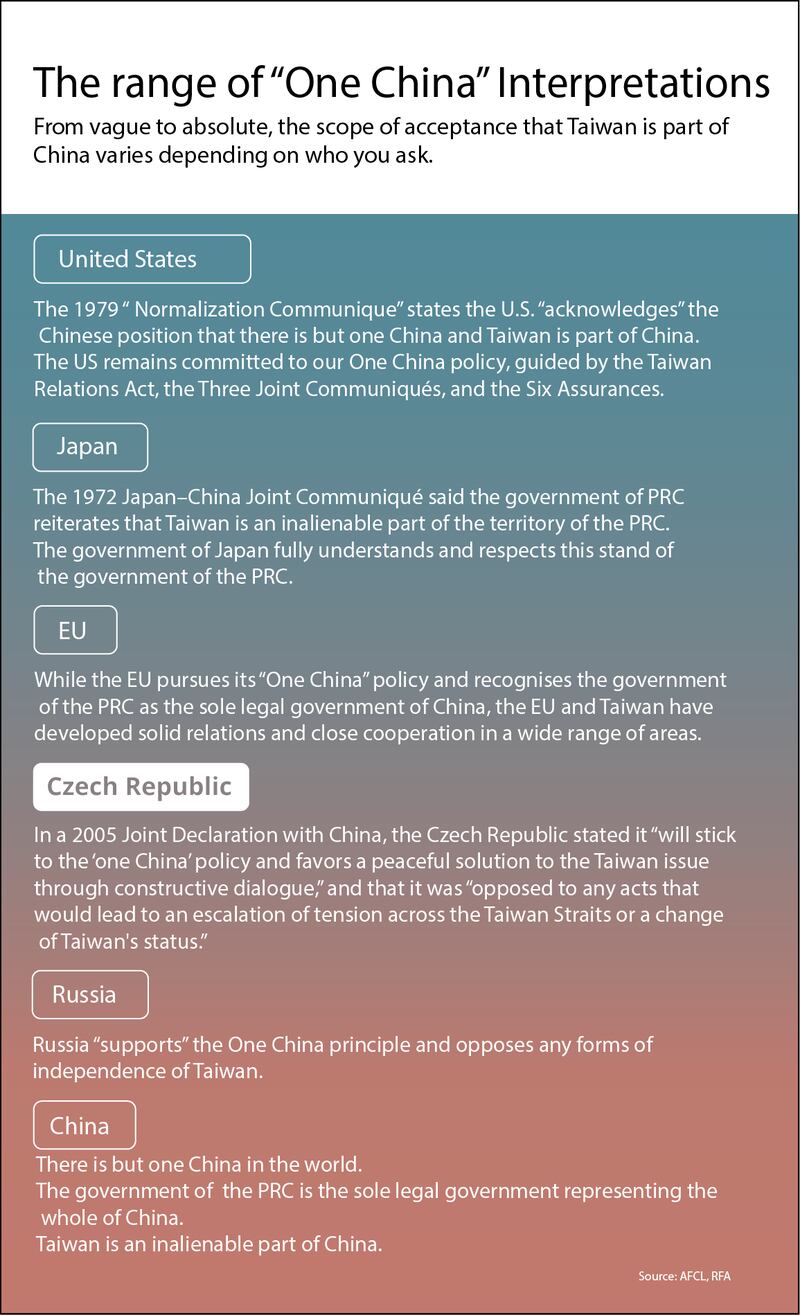In Brief
China recently accused the Czech Republic of violating the one-China principle, but the Czech Republic claims to adhere to a one-China policy. Policy versus principles – is it just semantics or is there a real difference? Must all countries’ one-China policies mirror Beijing’s one-China principle?
Asia Fact Check Lab (AFCL) found that while China has made recognition of “one China” a precondition for establishing diplomatic relations with Beijing, countries differ in their interpretation of what a one-China policy means. China often misleadingly claims that other countries have pledged to adhere to its one-China principle.
In Depth
Are the one-China policies of the Czech Republic and the EU in line with the one-China principle upheld by China?
On Jan. 30, Czech President-elect Petr Pavel and Taiwan President Tsai Ing-wen spoke in a congratulatory phone call following his election victory. He agreed to strengthen his country's partnership with Taiwan and expressed hope that he could meet Tsai in person in the future. Taiwanese presidential spokesperson Lin Yu-chan said the call lasted nearly 15 minutes.
Chinese Foreign Ministry spokeswoman Mao Ning said at a news conference the following day that the call between Pavel and Tsai "seriously interferes in China's internal affairs, blatantly violates the Czech side's political commitment to the one-China principle, and sends a wrong signal to the separatist forces of 'Taiwan independence.'" She urged the Czech Republic to undo the call's "negative impact."
According to Beijing, its one-China principle is clear and unambiguous: that "there is but one China in the world, Taiwan is an inalienable part of China, and the Government of the People's Republic of China is the sole legal government representing the whole of China."
The top concern of the PRC government under the one-China principle is that other countries do not treat Taiwan as an independent country. Chinese authorities view actions such as meetings or phone calls by top leaders of other countries with Taiwan leaders as violating China’s sovereignty.
Good relations with democratic Taiwan
The hitch is that the Czech government never agreed to adhere to the one-China principle. Instead, according to the website of the Czech embassy in China, the Czech Republic adopts a one-China policy. Czech Prime Minister Petr Fiala reiterated Prague’s position in response to China’s criticism.
"Czechia respects and represents its own one-China policy," Fiala said, according to a Jan. 31 Associated Press report. "As a sovereign country it is us who decide whom we call or whom we meet." He added that "we traditionally have good economic, educational, and research relations with democratic Taiwan."
The Czech Republic's one-China policy mirrors that of the EU, which has long recognized the PRC as the sole legitimate government of China while simultaneously developing strong relations with Taiwan.
Are other countries’ one-China policies in line with the one-China principle?
The United States’ longstanding one-China policy, based on several diplomatic communiqués and other agreements issued between 1972 and 1982, also differs from China’s one-China principle.
The U.S. and the PRC established diplomatic relations on Jan. 1, 1979, signing a U.S.-China joint communiqué which differed in a key word choice regarding the two countries' position on the PRC’s interpretation of “one China.” The English version states that the U.S. “acknowledges” China's position that “there is but one China and Taiwan is part of China,” while the Chinese version used“承认”, which is often translated as “recognizes” or “accepts.”
Later statements by U.S. officials emphasize that this choice of terms is both deliberate and significant. Raymond Burghardt, former chairman of the American Institute in Taiwan, the U.S.'s de facto embassy in Taiwan,, "For the past 37 years, the United States has made it clear that 'acknowledge' does not mean recognize, does not mean accept, does not mean anything else except 'acknowledge.'" U.S. State Department spokesman Ned Price tweeted in May 2022 that, "The United States does not subscribe to the PRC's 'one-China principle' – we remain committed to our longstanding, bipartisan one China policy."
In a previous statement, the State Department explained the U.S. one-China policy in greater detail: "The United States recognizes the People's Republic of China as the sole legal government of China and acknowledges the Chinese position that Taiwan is part of China" (italics added).
And in the Taiwan Relations Act of 1979, the U.S. states that the future of Taiwan must be determined by peaceful means and not by either side unilaterally. The Act also commits the U.S. to providing Taiwan with arms and services to maintain its defense.

The U.S. has deliberately taken an ambiguous position on Taiwan to allow Washington to maintain relations with China while continuing to cultivate close trade, military, and other ties with the democratic island. But U.S. support of Taiwan has sometimes angered Beijing, most recently with then-House Speaker Nancy Pelosi’s visit to Taiwan in August 2022.
Many other Western nations have also implemented one-China policies that allow flexibility in their dealings with Taiwan. However, some countries such as Russia and Turkmenistan have issued joint statements with China that explicitly commit to adhering to the one-China principle.
For its part, Taiwan's Ministry of Foreign Affairs argued that the PRC does not represent Taiwan internationally and "should not use its fabricated 'one China principle' to compel other countries, international organizations or enterprises to make statements against their will which are contrary to reality."
Conclusion
Asia Fact Check Lab concludes that Chinese claims that the Czech Republic and other countries have committed to the one-China principle and its position on Taiwan’s status is misleading.
Many countries have adopted their own one-China policies which allow them to retain ambiguity and flexibility in their dealings with Taiwan and mainland China.
Asia Fact Check Lab (AFCL) is a new branch of RFA established to counter disinformation in today’s complex media environment. Our journalists publish both daily and special reports that aim to sharpen and deepen our readers’ understanding of public issues.
